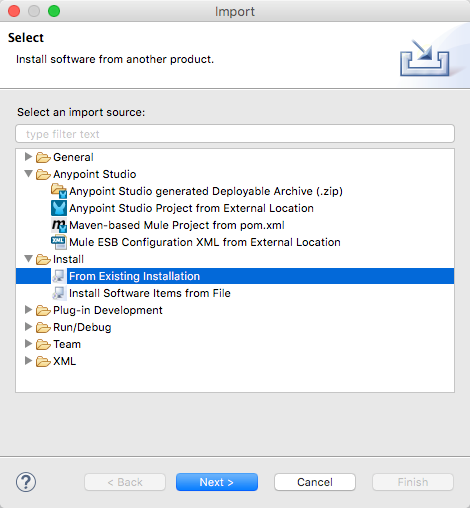
Anypoint Studio January 2015 with 3.6.1 Runtime - Update Site 2 Release Notes
February 25, 2015
This January 2015 release is an update to the Studio January 2015 with 3.6.0 runtime, and complements the Anypoint Studio January 2015 with 3.6.0 Runtime Release Notes.
Current Release Versions
| Enterprise Runtime | Community Runtime | |
|---|---|---|
ESB Runtime |
n/a |
n/a |
Studio |
Version: January 2015 with 3.6.1 Runtime - Update Site 2 |
|
Management Console |
n/a |
n/a |
Mule DevKit |
3.6.0 |
|
Fixed Issues
This update addresses the following issues:
-
Descriptions for fields are now shown in DataSense Explorer.
-
Studio no longer deletes SQL queries in a project when deleting global elements.
-
A connector configuration now correctly creates in a project when switching between editors.
-
The mule-deploy.properties file now updates when launching applications using Maven.
-
The Search RAML library in an HTTP Connector configuration now correctly opens a new tab in the system browser.
-
Fixed: Cannot edit a Run Configuration that has configured a missing Mule runtime.
-
Fixed parsing of complex WSDLs for WS Consumer.
-
Fixed NullPointerException when resolving Types with duplicate fields in Query Builder.
-
Fixed NullPointerException when exporting/running a domain project that uses the Database component.
This release also supports the Mule ESB 3.6.1 runtime which addresses a critical security issue. You can install this by going to Help > Install New Software and selecting the Anypoint Studio Update Site update site.
Migration Guide
This section presents configuration considerations you may want to adjust when migrating from a previous version of a Mule runtime, or previous version of Studio. Contact MuleSoft Support if you have a question about a specific migration activity or concern.
To migrate from a previous version of Studio, use Help > Check for Updates.
|
You can easily import all of the external components that you had installed in your old version of Anypoint Studio through a single action. This includes connectors, runtimes, and any other type of extension added through the Anypoint Exchange or the Help → Install new software menu, as long as there are no compatibility restrictions. Do this by selecting File→Import and then choose Install→From existing installation. 
Then specify the location of your old version of Anypoint Studio in your local drive. |



